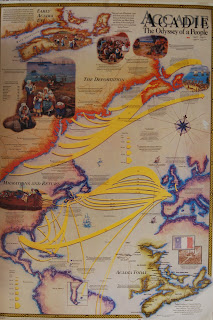Now it is time to write about the Acadians in the family - and there are many!
 |
| Statue of Evangeline at Grand Pré historic site |
You may ask "who"and "what" are Acadians? Well, when I first learned about the Acadians I was seven, maybe eight, years old. My mother Dorothy, read me a poem from a book in our home titled "Evangeline, a tale of Acadia". I don't think I completely understood all the details, I only understood it was a sad love story. Poor Evangeline and her boyfriend, Gabriel were planning to get married and something terrible happened to separate them. They never reunited until, many years later, Gabriel was on his deathbed - a romantic drama just like the kind my mother liked! I am not certain if my mother realized she actually had Acadian ancestors who lived through the events and time of the heroine. The story made me interested enough to learn more about these people. Years later, I had a Doug Kershaw, the "Ragin' Cajun", album and listened to the fiddlin in "Louisiana Man" over and over. When I lived in northern Louisiana, I couldn't wait to travel to Cajun county - Lafayette and St. Martin County.
Evangeline, a Tale of Acadia is a poem written by Henry Wadsworth Longfellow and can be found here and/or here.
 |
| An image of Grand Pré |
And what were the terrible events? Acadians lived in the French colony since 1630; the English conquest of Port Royal in 1710 ultimately brought the colony under British control. In September-October of 1755, amid the Seven Years War in the land that is now called Nova Scotia, English troops gathered all the French speaking colonists around the area of Grand Pré, Port Royal and Beaubassin in Acadie. Six thousand individuals were impounded on ships, their homes burned, their lands confiscated. Hundreds, if not thousands perished in the ordeal. Families were split apart and shipped to destinations in the British colonies including Massachusetts, Connecticut, Maryland, New York, Georgia, Carolina and Pennsylvania. Survivors to those destinations were usually shunned because of their Catholicism in Protestant communities. Even in Maryland, founded as a Catholic colony, Acadians were not welcomed. Over the next 10 to 15 years , many Acadians made their way back to French speaking areas of Quebec or other areas in present day New Brunswick, Maine and of course Louisiana. This event is referred to as Le Grand Dérangement or the Great Expulsion or the Great Upheaval.
The best sites to read for details about Acadian History are ACADIAN-CAJUN and the EXILE
Some of the Acadian colonialists were shipped to French colonies and some even back to France. The Acadian ancestors of the families noted in this blog, Mylott, Rivet, and Wills were shipped to New England ports - Connecticut and Massachusetts. Over the course of a decade, they made their way to settlements created by French speaking communities of Québec especially for Acadian refugees in Québec: St Jean de L'Acadie (south of Montréal) and St. Jacques de L'Achigan (east of Montréal).
 |
| Click on image to enlarge |
Below is a recap of the stories written about Acadians in this blog so far. This list includes some early posts that may not have been well researched but I am reviewing them for accuracy and hope they will "make the cut"!
Acadians in the Wills & Beauvais Family
The Pembroke
Remembering Acadian Ancestors
New Acadia, St-Jacques-de-l'Achigan, Quebec
Images of St-Jacques-de-l'Achigan
Petite l'Acadie in St Jean
Teaching Children about Acadian Ancestors
On the Way to Acadian World Congress 2014
We are the same...
"almost an idiot"
Lord Family of St Jacques de l'Achigan
The Pembroke
Remembering Acadian Ancestors
New Acadia, St-Jacques-de-l'Achigan, Quebec
Images of St-Jacques-de-l'Achigan
Petite l'Acadie in St Jean
Teaching Children about Acadian Ancestors
On the Way to Acadian World Congress 2014
We are the same...
"almost an idiot"
Lord Family of St Jacques de l'Achigan


No comments:
Post a Comment